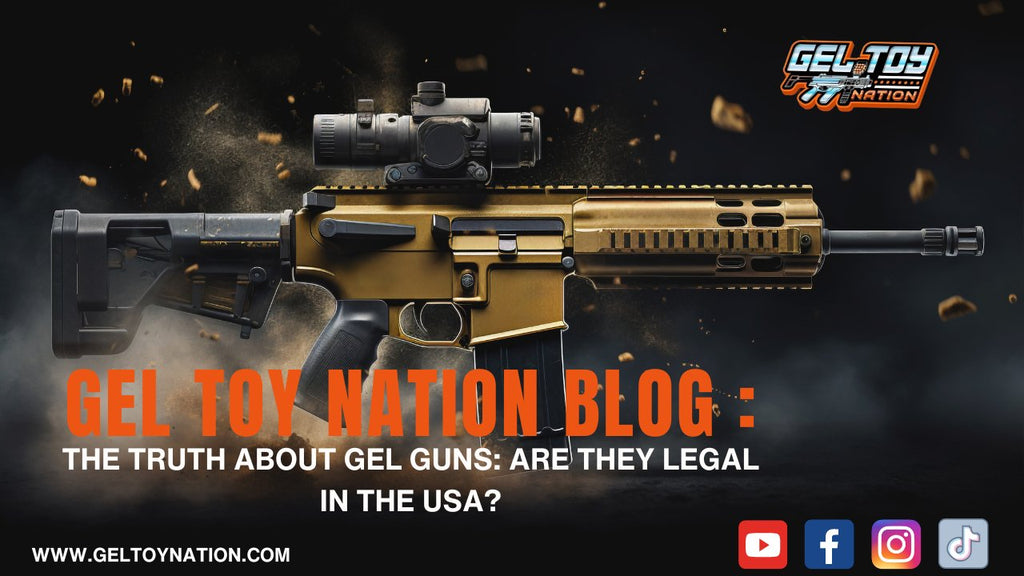The Truth About Gel Guns: Are They Legal in the USA?
Gel guns, also known as gel blasters or gel ball blasters, have gained popularity as a fun and safe alternative to paintball and airsoft. However, their legality in the USA can sometimes be a point of confusion. In this blog, we’ll explore the current legal status of gel guns in the USA, ensuring you stay informed and compliant while enjoying this exciting hobby.
Understanding Gel Guns
What Are Gel Guns?
Gel guns are toy guns that shoot small, water-absorbent gel balls, known as gellets. These gel balls expand when soaked in water and burst upon impact, making them a safe and eco-friendly option for recreational shooting.
How Do They Work?
Gel guns operate using either manual or electric mechanisms to shoot the hydrated gel balls. The gel balls are non-toxic, biodegradable, and cause minimal pain or injury upon impact, making them ideal for casual play.
Legal Status of Gel Guns in the USA
Federal Regulations
At the federal level, gel guns are generally considered toys and are not classified as firearms. This means they do not fall under the stringent regulations that govern real firearms. However, their appearance and function can sometimes lead to legal complexities.
State and Local Regulations
The legality of gel guns can vary significantly from state to state and even within local jurisdictions. Here are some general points to consider:
1. Color and Appearance:
- Orange Tips: To distinguish them from real firearms, many states require toy guns, including gel blasters, to have bright orange tips. This helps law enforcement and the public easily identify them as toys.
- Bright Colors: Some states mandate that toy guns be brightly colored to further differentiate them from actual weapons.
2. Age Restrictions:
- Minimum Age: Certain states have minimum age requirements for purchasing or using gel guns. Ensure you are aware of any age restrictions in your area.
3. Usage Restrictions:
- Public Spaces: Using gel guns in public spaces, such as parks or streets, is often prohibited to prevent confusion and ensure public safety.
- Private Property: Gel guns are typically allowed on private property with the owner’s permission. However, always check local laws to confirm.
Specific State Examples
California:
- California has strict regulations regarding the appearance of toy guns. Gel blasters must have bright orange tips or be brightly colored to be legally used.
New York:
- New York City has stringent rules, banning the sale of toy guns that look too realistic. Gel blasters must comply with these regulations to be legally sold and used.
Texas:
- Texas has more lenient laws regarding gel guns, but users should still ensure they are not brandishing them in public spaces to avoid potential legal issues.
Best Practices for Gel Gun Enthusiasts
1. Always Use in Designated Areas:
- Use gel guns on private property or in designated play areas to avoid legal complications and ensure a safe environment for everyone.
2. Follow Local Laws:
- Familiarize yourself with state and local laws regarding the use and appearance of gel guns. Compliance with these laws will help you avoid legal troubles.
3. Use Protective Gear:
- Even though gel guns are generally safe, wearing protective gear such as eye protection is a good practice to prevent any accidental injuries.
4. Educate Others:
- Inform friends and family about the safe and legal use of gel guns to promote responsible enjoyment of this hobby.
Conclusion
Gel guns offer a fun and safe way to engage in recreational shooting activities. While their legality is generally straightforward at the federal level, state and local regulations can vary. By understanding and complying with these regulations, you can enjoy your gel gun activities without any legal concerns.
For more information on gel guns and to explore a wide range of products, visit GelToyNation. Stay safe, informed, and have fun with your gel blaster adventures!






























Comments (0)